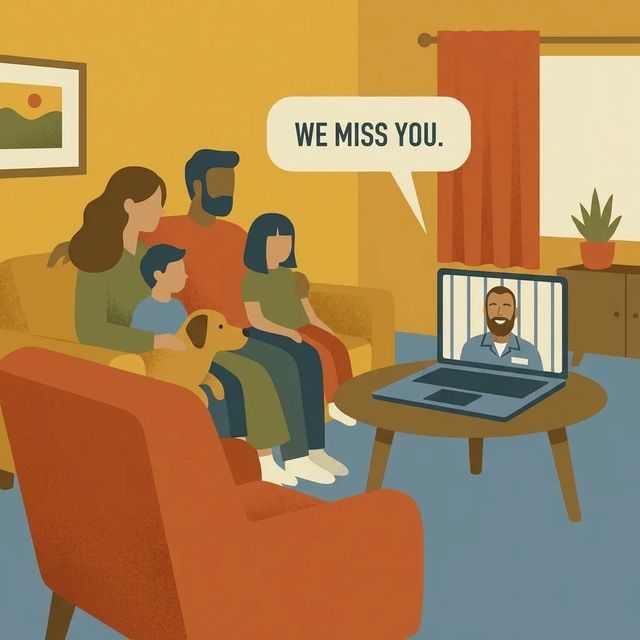Hays County Jail
Explore
Find an Inmate at Hays County Jail
Search for a loved one and send messages and photos in minutes.

Guides for This Facility

Setting up video visits at Hays County Jail: registration, ID, approval times, and scheduling
Video visits at Hays County Jail run through Securus, and setup is straightforward once you know the steps. Here's how to register, get approved, and book your first off-site visit without surprises.
Read Guide
Video visit rules at Hays County Jail: dress code, minors, visit limits, and monitoring
Video visits are the easiest way to stay connected with someone at Hays County Jail, but the facility enforces specific rules. Here's what you need to know to avoid a denied, cut-short, or canceled visit.
Read Guide
Four ways to put money on an inmate's account at Hays County Jail (money orders, online, phone, kiosk)
Need to add funds for someone at Hays County Jail? You have four options: mail a money order, deposit online through AccessCorrections, call in a payment, or use the lobby kiosk at the Law Enforcement Center. Here's how each method works and what to watch for so your deposit posts correctly.
Read GuideAt a Glance
Visitation
- Off‑site video visits via Securus may be scheduled daily from 7:30 a.m. to 9 p.m.
- Each off‑site video visit is 25 minutes long; inmates are limited to two off‑site video visits per day and onsite visits are limited to two visits per week.
- Visitors must be at least 17 and present a valid government‑issued photo ID during initial video‑visit registration; approvals typically take 24–48 hours.
Communication
- Securus Technologies provides phone services for Hays County Jail.
- Call payment options at Hays County Jail include Advance Connect (prepaid receiver accounts) and Direct Bill.
- To access Securus phone services for Hays County Jail, visit securustech.net and select Texas, then Hays County Jail.
Mail & Letters
- Hays County no longer accepts personal mail directly; all personal mail must be sent to the Securus Digital Mail Center (Tampa PO Box) for processing.
- Mail received at the Securus processing center will be digitally scanned and made available on tablets or kiosks if approved.
- Original correspondence retained by Securus is kept for 30 days before being destroyed.
Sending Money
- Mail money orders to Hays County Jail at 1307 Uhland Rd, San Marcos, TX 78666 and include the inmate’s name on the money order.
- Money orders mailed to the jail must not include any personal letter in the envelope or the envelope will be returned.
- Mailed money orders must be received by 8 a.m. on Monday to be eligible for commissary that same week.
Contact Info
- Mailing address for items (including money orders): Hays County Jail, 1307 Uhland Rd, San Marcos, TX 78666; address items with the inmate’s name.
- Have the inmate’s full name, known aliases, and date of birth ready when you call or submit an inquiry.
- Non-urgent questions are often best handled via the facility’s website contact form or main office phone line.
Based on official sources and community feedback. Learn how we verify
Topic Overviews
Visitation
Hays County Jail uses Securus for off-site video visitation, with appointments available daily from 7:30 a.m. to 9 p.m. Schedule through the Securus Video Visitation website and complete their online registration and verification steps. Each off-site video visit lasts 25 minutes. Inmates can have up to two off-site video visits per day; onsite visits are limited to two per week. You must be at least 17 to register and provide a valid government-issued photo ID during signup—approvals typically take 24–48 hours. All visits are recorded and monitored by jail staff. Dress conservatively: nudity, provocative, or tight-fitting clothing is prohibited. Visitors under 17 must have a parent or guardian present.
Read full guideCommunication
Phone calls and video communication at Hays County Jail run through Securus Technologies. Calling plans include Advance Connect (a prepaid account set up for the person receiving calls) and Direct Bill. To set up service, fund an account, or manage your options, go to securustech.net and select Texas, then Hays County Jail. If you run into audio or video trouble during a video visit, contact Securus Video Visitation support or call 800-844-6591. Other communication features—like messaging or tablet access—can vary by unit, so check the inmate's facility page or the Securus portal to see what's available.
Read full guideMail & Letters
Hays County Law Enforcement Center stopped accepting personal mail on-site effective 9/12/2022. To send a personal letter, address it to the Securus Digital Mail Center at the designated Tampa PO Box for Hays County processing—don't mail personal correspondence directly to the jail. Securus scans approved mail and delivers it digitally through inmate tablets or kiosk devices (not as the original paper). Want the original returned instead? Include a self-addressed, stamped envelope with your letter. Originals that Securus keeps are retained for 30 days, then destroyed. Items that can't be scanned (paper larger than 8.5 x 11 inches or non-paper items), along with all packages and certified mail sent to the processing center, are returned to the sender.
Read full guideSending Money
To add funds for an inmate at Hays County Jail, mail a money order to 1307 Uhland Rd, San Marcos, TX 78666. Include the inmate's name on the money order, and don't include any personal letter in the envelope—mail with a letter will be returned. If you want funds available for commissary that same week, the money order must arrive by 8 a.m. on Monday, so plan for mail delivery time. You can also deposit to the inmate trust fund online or by phone through AccessCorrections (1.866.345.1884). A deposit kiosk is available in the Hays County Law Enforcement Center lobby Monday–Friday, 8 a.m. to 5 p.m. (excluding county holidays).
Read full guideCommon Questions
Showing 6 of 15How do I schedule an off‑site video visit with an inmate at Hays County Jail?
Schedule through the Securus Video Visitation website. Off-site video visits are available daily from 7:30 a.m. to 9 p.m. You'll need to create and verify your account with a valid government photo ID—approvals typically take 24–48 hours.
VisitationHow long are video visits and how many can an inmate have?
Off-site video visits are 25 minutes each. Inmates are limited to two off-site video visits per day, and onsite visits are limited to two visits per week.
VisitationCan minors participate in Hays County Jail video visits?
Yes, but visitors under 17 must have a parent or guardian present for off-site video visits. To register independently, you must be at least 17 and provide a government-issued photo ID during initial registration.
VisitationWho provides phone service at Hays County Jail?
Securus Technologies provides phone service at Hays County Jail. Calling options include Advance Connect (prepaid receiver accounts) and Direct Bill.
CommunicationHow do I set up or fund a phone account to call an inmate at Hays County Jail?
Go to securustech.net, choose Texas, then select Hays County Jail to access the vendor page for setup and funding. You’ll register your phone number and provide the inmate’s ID, then choose a prepaid or billing option.
CommunicationWho do I call for help with video visits or phone issues at Hays County Jail?
For audio or video problems during a video visit, contact Securus Video Visitation support or call 800-844-6591. That same number can also help with Securus phone service issues.
CommunicationMore Guides
Ready to Connect?
Search for your loved one to start communicating today
Did You Know?
Hays County Jail (the Hays County Law Enforcement Center) in Texas stopped accepting personal mail directly on 9/12/2022; all incoming mail is now handled through a digital mail processing center.
This guide is based on feedback from 64 families and official facility documentation. Learn how we verify
